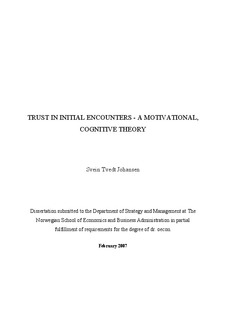| dc.description.abstract | In this dissertation I develop a theoretical model on the effects of risk on the formation of trust
in the initial stages of a relationship. Risk is proposed to influence trust in two ways: First,
risk exerts a direct influence on trust. Risk may decrease trust, increase trust, or increase trust under specific conditions. Second, risk may affect the level of trust indirectly by influencing the effect of social stimuli on the formation of trust. In this second indirect effect of risk, risk
is first proposed to influence the content of trust, or what trust is about as represented in the importance a trustor attaches to benevolence or ability. Moreover and related to the effect of risk on the form of trust, risk is further proposed to affect what people seek to know or the informational goals people adopt, and the interpretive schemas people use while processing
social stimuli. In describing the indirect effect of risk on the formation of trust, I differentiate between rolebased and personal trust. Role-based trust emphasizes ability and reliability and is vested in
people’s structural expectations toward social and professional roles. Personal trust
emphasizes benevolence and is vested in a trustor’s appraisal of the personal traits and
motivations of a trustee. High risk, I argue will activate personal trust, and cause people to
interpret information in light of a person schema whereas low risk is proposed to activate rolebased
trust and should cause people to interpret information in light of a role schema. Unlike
conventional models of trust formation and development, which see trust as being based on
declarative knowledge; the present model argue that trust in the initial stages of a relationship
will be based on people’s experience with information processing and their experiences of
fluency in information processing and relevance. Social stimuli that are structurally congruent
with active interpretive schemas as well as relevant to active informational goals will increase
trust whereas incongruent and irrelevant information should reduce trust. | en |
